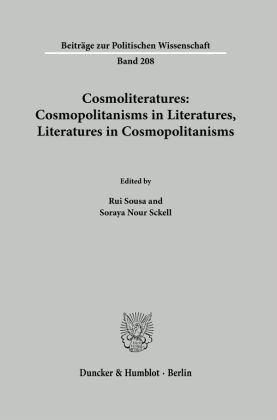Cosmoliteratures: Cosmopolitanisms in Literatures, Literatures in Cosmopolitanisms
| Verlag | Duncker & Humblot |
| Auflage | 2025 |
| Seiten | 137 |
| Format | 16,0 x 1,0 x 23,5 cm |
| Gewicht | 240 g |
| Artikeltyp | Englisches Buch |
| Reihe | Beiträge zur Politischen Wissenschaft 208 |
| ISBN-10 | 3428188047 |
| EAN | 9783428188048 |
| Bestell-Nr | 42818804A |
Cosmopolitanism aspires to openness and universality, yet it is fraught with contradictions. While seeking to transcend borders, it has often concealed exclusions and hierarchies. This volume explores these tensions through literature and political philosophy, examining how writers and philosophers - from Camões to Woolf and Conrad, from Kant to Appiah - have engaged with belonging, power, and identity. Rather than a fixed ideal, cosmopolitanism emerges as a contested space, shaped by both connection and inequality.
Cosmopolitanism has often been regarded as an ideal of openness, dialogue, and universality, yet it remains fraught with contradictions. While aspiring to transcend borders and affirm a shared human condition, it has frequently been entangled with histories of exclusion, imperialism, and uneven power dynamics. This volume brings together perspectives from literature and political philosophy to critically examine the tensions at the heart of cosmopolitan thought.
In literature, cosmopolitanism appears as both a promise and a paradox - expressed through narratives that celebrate cultural encounters but also expose hierarchies and asymmetries. From Camões to Woolf and Conrad, writers have explored the complexities of belonging, displacement, and the limits of global exchange. Their works reflect the ambivalence of a cosmopolitan imagination that both embraces and questions the possibilities of interconnectedness.
In political philosophy, the debate extends to issues of citi zenship, law, and democracy: to what extent can cosmopolitan ideals challenge national frameworks, and where do they risk reinforcing exclusion under the guise of universality? Thinkers from Kant to Appiah have interrogated the ethical and political dilemmas of cosmopolitanism, revealing its potential to expand solidarity beyond borders while also highlighting its structural limitations.
Rather than presenting a singular vision, this book explores cosmopolitanism as a site of tension - between openness and exclusion, universality and particularity, theory and lived experience. By confronting these contradictions, it invites a deeper reflection on the possibilities and limits of a world shaped by interconnected yet unequal histories.
Inhaltsverzeichnis:
Nuno Miguel ProençaThe »Lusiads effect«: a Tension Towards Imperialism or Cosmopolitanism?Pedro António Monteiro FrancoThe Ambiguous Cosmopolitanism of Joseph Conrad A Reading of Heart of DarknessMarco BucaioniHow Do You Say »Afropolitan« in Portuguese? African Literatures, Black-Portuguese Literature and AfropolitanismSara FernandesVirginia Wolf & the Cosmopolitan SelfSoraya Nour SckellThe Invention of the Self and of the Cosmos: Cosmology and Poetics of the Self in the Work of Paulo CardosoMárcio SuzukiWhat Does it Mean to be Cosmopolitan? A Note on the History of the ConceptHelena InácioThe Global Constitutionalization Undertaken by the United NationsLasha KharaziUnivocity and CosmopolitanismPedro António FrancoTradition and Cosmopolitanism in Alasdair MacIntyre and Kwame Anthony AppiahMarco RussoA Broad-Minded Way of Thinking. Cosmological Perspectives in Kantian Cosmopolitanism
Cosmopolitanism aspires to openness and universality, yet it is fraught with contradictions. While seeking to transcend borders, it has often concealed exclusions and hierarchies. This volume explores these tensions through literature and political philosophy, examining how writers and philosophers - from Camões to Woolf and Conrad, from Kant to Appiah - have engaged with belonging, power, and identity. Rather than a fixed ideal, cosmopolitanism emerges as a contested space, shaped by both connection and inequality.

